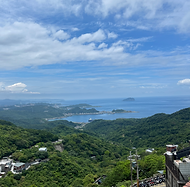Gabriel Ratcliffe
Study Abroad
My Time in Taiwan
In the summer of 2023, I spent three months studying and living in Taoyuan, Taiwan. My main desire during my summer abroad was to fully immerse myself in the language and culture and to come back from my summer abroad with a rich understanding of Mandarin, Chinese. In the days leading up to my flight to Taiwan, I felt a combination of excitement and terror, as I had no idea that the next several months would be the most transformative time of my life.
Before going to Taiwan, my main focus was to improve my language skills by any means necessary. I always enjoyed practicing my Mandarin with anyone who would be willing; however, having to rely on it to get around and survive was a completely different experience from what I was used to. Going from a classroom setting, where I had teachers to help me with pronunciation, reading, and writing, to depending on my foreign language ability to survive was frightening and exhilarating all at the same time.
After a grueling twenty-hour flight, I was immediately met with massive culture shock. Everything, ranging from the food on the plane, the cars on the highway, and even the architecture of the buildings around me, were foreign to me. I felt lost and homesick, but I was still determined to improve my language skills. However, the feeling of homesickness was replaced by awe a few hours later, as I found myself wandering around the night market looking for something to eat.
My first time in the night market was the most surreal experience I had during my time in Taiwan. Although my excursions into the night market ultimately became a casual daily ritual for me, my first time hunting for dinner, while simultaneously dodging motorcycles in the crammed narrow streets was mindblowing. The smells of fried chicken, soup dumplings, fresh fruit, and fermented tofu hit my jet-lagged, famished self like a ton of bricks. I was completely in awe of everything around me. The jam-packed streets, with thousands of people all gracefully weaving in and out of each other, blew my mind. The same street that was relatively quiet during the day, was now all of a sudden completely alive and incredibly overwhelming. All around me, I noticed people staring, taking pictures, and pointing at me, and I was met with even more staring and pointing after I rattled off my order at the dumpling stand in Mandarin. After getting back to my apartment that night, with a stomach full of delicious foods I had never tasted before, I felt exhausted by my one-hour excursion to the next street over.
After a few more days of battling my comfort zone, I attended my first class at my host university, where I realized that my study abroad experience was going to be not only very unique but also extremely rewarding. My classes consisted of a professor and a body of students from all over the world. Many of my classmates were people from other Southeast Asian countries such as Vietnam, Indonesia, Thailand, etc. I had always perceived a traditional study abroad experience to consist of a group of American students taking classes and spending their free time exploring the country together. Needless to say, when the safety net of familiarity that I was anticipating, I felt quite nervous.
After a few days had passed, I started to become friends with my classmates. Because the only common language we all shared was Mandarin, I noticed rapid improvement in my language ability. This felt like a huge accomplishment after only spending about a week in Taiwan, I felt like I had already taken a massive step towards reaching my goal of achieving fluency. On top of improving my language ability, I was also achieving a level of cultural awareness and fluency that I did not know was so valuable. This realization came at a restaurant, where my friends from Indonesia, Thailand, and Vietnam all went out to get dinner with each other. During this dinner, we talked about our respective countries in a deeper way than I was used to, even with my American friends back home. We shared the political challenges of our countries and talked about social issues, all in Mandarin. We stayed in that restaurant for hours, and this is when I realized that the importance of studying abroad is not only to get better at a language but to exchange cultures and educate oneself on the cultures and practices of people from all around the world. My classmates, who had been strangers a few days prior, had turned into good friends who played an instrumental role in developing my cultural awareness.
One of my favorite moments of being exposed to Chinese culture was sitting down for a traditional Chinese meal with my class. The table was completely covered with a wide variety of dishes—steamed fish, sliced meats, soup dumplings, stir-fried vegetables, noodles, and more. Every dish was meant to be shared, placed in the center of the table so everyone could reach in with chopsticks and take what they wanted. It was such an interesting cultural exchange because, unlike the typical American style of dining where each person has their own individual plate, this communal approach to eating reflected values of togetherness and sharing. The experience gave me a deeper appreciation not just for the food but for how meals can bring people together in different ways across cultures.
As the weeks went by and I settled into a routine, the feeling of being overwhelmed and scared had completely vanished. I was taking taxis all over the country, having fun and lively conversations with my taxi drivers. I was taking trains to different cities and exploring places on my own. I was making friends with locals and gaining a new perspective on my worldviews. Those same initial excursions into the night market that were so overwhelming the first time around now became a daily activity. I was a local customer to many of the vendors, and those same people always had my food order waiting for me every night when I came around. I had assimilated into Taiwanese culture far better than I ever thought possible and made priceless relationships along the way. I came to Taiwan eager to get better at Mandarin, and I left there with a level of proficiency I did not know I could reach and with a deep understanding and appreciation for the culture and people.
My study abroad in Taiwan had many challenges. Even after I made friends and established a routine, I still felt the occasional homesickness that anyone who was a twenty-hour plane ride and a twelve-hour time zone difference away would. I believe that my time spent studying abroad in Taiwan has been the most rewarding experience of my life. I improved dramatically in my Mandarin, and realized a passion for foreign culture while doing so. Overall, the experience has completely changed my worldview and has given me a deep appreciation for foreign languages and cultures.









